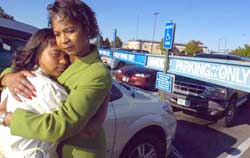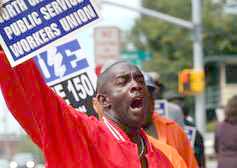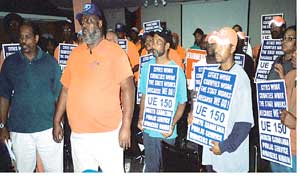Victims of racist cop lead protest
On Sept. 30 CopWatch activists, community members and victims of police brutality—Loree McCormick-Rice and her family—protested against the latest case of police brutality in Aurora, Colo.
 Cassidy McCormic |
Pedestrians and people in cars showed a lot of support. People also stopped to recount horrible incidents of terror at the hands of Aurora and Denver cops. Many people talked about being stopped by cops for no reason and being made to strip on the side of the road, a violation of all their rights.
The protest was called for Loree McCormick-Rice and her daughter, Cassidy McCormick, who say Aurora cop Sgt. Charles DeShazer beat them brutally on June 17.
What makes this latest case even more despicable is that McCormick-Rice is disabled. She suffers from severe asthma and has had one of her lungs removed. Cassidy, her daughter, is only 12 years old.
Workers World interviewed them after the demonstration to get their take on what happened last June. Their story follows:
On the night they were beaten, McCormick-Rice and Cassidy were leaving a King Soopers supermarket in Aurora. DeShazer, who moonlights as a security guard for the supermarket, approached them.
McCormick-Rice was parked in a handicapped parking spot. DeShazer asked where her handicapped placard was and she pointed it out. She had to point it out twice to him, and then pointed to her carbon dioxide and a nebulizer to relieve asthma, which were on her seat.
 Cassidy McCormick. " border="1"> Cassidy McCormick. " border="1"> Loree McCormick-Rice and her daughter, Cassidy McCormick. |
A white woman who did not have her placard displayed openly approached McCormick-Rice. The white woman remarked: “That’s just pure racism. When will it ever end? I’m parked right here next to you in a handicapped zone without a placard and he walked right pass me and didn’t question me, and yet he’s harassing you.”
DeShazer, as he was walking away, said, “F—king n——s.” The woman talking to McCormick-Rice volunteered her name and number as a witness. Other witnesses also said they overheard the slur.
When DeShazer admitted to McCormick-Rice that he had used that racist insult, Cassidy suggested they report him to the store manager. Back in the store, another woman of color, overhearing McCormick-Rice’s complaint at the Service Desk, volunteered that she had had problems with DeShazer before.
As McCormick-Rice was walking to her car after lodging a complaint, DeShazer, who was sitting in a blue Ford Taurus, called her a “f—king idiot.” She responded.
McCormick-Rice and Cassidy drove out of the parking lot. DeShazer pulled up behind them and flashed his lights. McCormick-Rice turned to pull back into the parking lot, which is well lit. It was 10 p.m. She and her daughter were afraid. DeShazer blocked their way and yelled for them to “Get out of the f—king car.”
McCormick-Rice asked DeShazer if they could go into the parking lot where there were witnesses, and DeShazer again yelled at her, this time saying, “Turn off your f—king engine.”
McCormick-Rice told Cassidy to go and get help. DeShazer grabbed the young girl by her arm, after threatening her if she didn’t get back into the car. DeShazer, a large man, shook the small, young girl repeatedly.
Cassidy screamed for help from her mother. DeShazer threw the child against the car and put her in handcuffs, while McCormick-Rice pleaded for him to let her daughter go and not to hurt her.
McCormick-Rice then got out of the car and put her arms around her daughter. DeShazer threw the mother to the ground. Witnesses noticed the attack. McCormick-Rice picked herself off the ground and tried to get her cell phone, which was ringing. It was her 15-year-old son, and she told him she needed help.
DeShazer grabbed her and threw her to the ground again. He put McCormick-Rice in handcuffs, stood up, stepped down on her and kicked her. He then threatened the witnesses who were gathering.
The “back-up” that DeShazer called for arrived. McCormick-Rice told them what had happened, but they laughed her off and refused to give her her medicine. When asked what he was charging them with, DeShazer said, “I’ll think of something.”
McCormick-Rice was having difficulty breathing, but was repeatedly denied her medicine and was told that she was faking.
DeShazer continued to be belligerent, even asking, “You still want to screw with me?”
The full-time security guard for the store came and corroborated McCormick-Rice’s story about the racial slur, but was told to accompany DeShazer into the middle of the street, where they had a brief conversation.
McCormick-Rice said she was worried about her daughter because they were put in separate cars. She heard Cassidy screaming and crying. Finally, one cop said that McCormick-Rice should be let go. A female cop threw McCormick-Rice’s shoes at her when she asked if she could have them back.
When McCormick-Rice returned to her car, she noticed that her purse had been rummaged through and that the witness list was gone. Cassidy was taken to the Aurora police station. The 12-year-old was bruised and crying when her family picked her up.
Cassidy’s shoulder was fractured, it was later discovered. McCormick-Rice and Cassidy were charged with obstructing a peace officer, resisting arrest and failure to obey. McCormick-Rice also received a charge of disturbing the peace.
This is their story. This latest episode is an outrage for many reasons, but it illustrates that incidents of police brutality are not isolated.
Young Cassidy would later ask her mom, “Is this what we get for being Black?”
The reality is that cops are agents of the racist capitalist state. But what’s more, the agenda of the racist state filters down through the capitalist-run media, which constantly demonizes people of color. Even a 12-year-old Black woman, who has received numerous school accolades and, after this ordeal, support letters from teachers, principals and deans of students of schools she has attended, is seen as less than human and brutally attacked.
However, the family has vowed to fight until DeShazer is fired, and to continue to fight against racism and police brutality. And the community has rallied around them, even trying to start a defense campaign.
DeShazer, though, is not an anomaly, a bad cop among good cops. He is one among an army of thugs whose job is to protect capital and to keep the poor, people of color and workers in line.


 protest at Raleigh City Hall. " border="1">
protest at Raleigh City Hall. " border="1"> 

